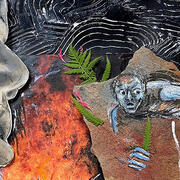
This fall at Harvard Divinity School, environmentalist, author, and HDS Writer-in-Residence Terry Tempest Williams is leading a series of online conversations concerning our response to climate chaos, asking the questions: How might we recast this a time of meaning rather than despair? How do arts and activism combine to let us see possibility instead of pessimism? And where do we find the strength to fully face all that is breaking our hearts?
The online discussions are part of the 10-week series, “Weather Reports: The Climate of Now.”
In the first of these discussions, held September 20, Williams spoke with Lucy Walker, a documentary filmmaker whose most recent film, Bring Your Own Brigade, explores the fires that wreaked havoc on Paradise and Malibu, California, in 2018. Respondent questioning was provided by Teresa Cavazos Cohn, a human geographer at the University of Idaho and an HDS Religion and Public Life Climate Change Fellow. (You can watch discussion on the HDS YouTube channel.)
Bring Your Own Brigade is an intense film. It uses recordings of 911 calls and video of people in cars surrounded by flames to show the deep trauma caused by fires. Moving beyond the immediate pain caused by the fires, though, Walker also uses the film to explore how people are grappling with the impact of climate change, on both personal and policy levels.
In her conversation with Williams and Cohn, it was fascinating to hear Walker speak about the ways in which she chose to craft her narrative, as well as how her relationships with the documentary’s subjects, and its central protagonist in particular, developed and gained meaning.
Cohn asked a particularly poignant question about horror as a genre and why Walker chose to make a film as chilling as she did, to which Walker responded by simply saying that it wasn’t horrifying as much it was truthful. That line was an elegant introduction into the conversation series. As a community, we will be taking up terrifying material and looking at it fearfully, honestly, and hopefully.
I’ll be writing about these Weather Reports most weeks, and as much as there is to say about the conversations that Williams, Walker, and Cohn had, I wanted to take some space in this reflection to include a note on a recurring feature of these conversations—a tea ceremony led by tea master Brian Kirbis.
When we logged in to the Zoom call, Kirbis was scooping tea leaves into a pot and pouring hot water over them. Instead of any sort of vocal description of what he was doing or why, a track of natural sounds—insects and water—was playing. When he finished brewing the tea, he poured it into two cups and drank from one of them. An anonymous hand emerged from behind the camera and took the other.
In its slowness, the ceremony was a little moment of ritual that invited the 1,000-odd people watching from around the world to pause and align ourselves in community, drinking tea, as we grappled with the existential questions provoked by climate change and humanity’s needs.
I look forward to being a part of that community again next week. We invite you join us for the next conversation on Monday, September 27, when we’ll hear from Bernadette Demientieff, executive director of the Gwich’in Steering Committee, on why sacred land protection matters to indigenous communities.
—by Owen Yager, MTS candidate